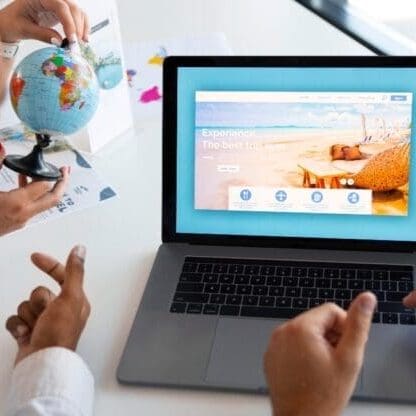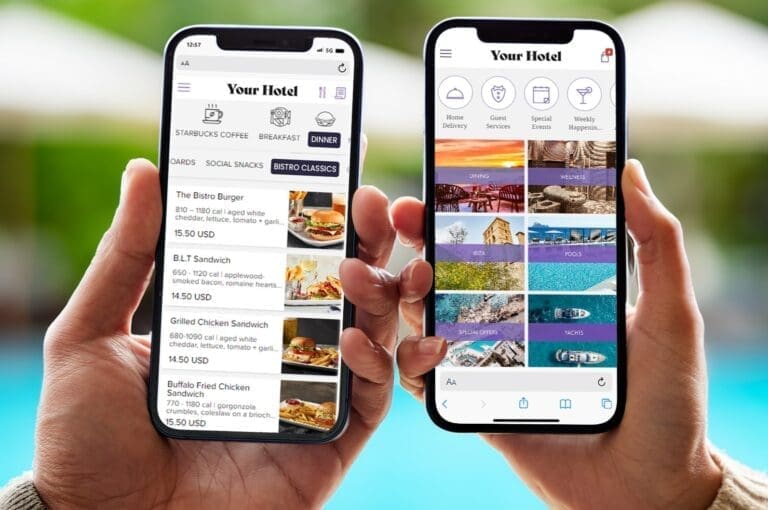 Since Chris Anderson wrote “The web is dead. Long live the Internet” in 2010, a pivotal article announcing the demise of traditional web browsing, the topic has been endlessly hyped in the media. However, there is a need for more factual study that takes an objective approach to measuring the impact of the usage of mobiles devices on hotel direct bookings.
Since Chris Anderson wrote “The web is dead. Long live the Internet” in 2010, a pivotal article announcing the demise of traditional web browsing, the topic has been endlessly hyped in the media. However, there is a need for more factual study that takes an objective approach to measuring the impact of the usage of mobiles devices on hotel direct bookings.
In their recent Hotel Supplier Website Benchmark report, Cendyn/ONE looked at the evolution of traffic and bookings by device in a sample that included more than 100 three- to five-star boutique hotels, resorts and casinos around the world, totaling over 400 million dollars in room revenues. The study compared visits, transactions, room revenue, Average Length of Stay (ALOS), and Average Daily Rate (ADR) to uncover how shifts in mobile usage are truly affecting e-commerce and website direct bookings. The study shows evidence that smartphones are becoming more than just a Top of the Funnel (TOFU) device.
Smartphone will become the primary trip planning device
Cendyn/ONE’s Benchmark Study about the effects of mobile on direct bookings shows that over the past two years, 17% of web searches have shifted to smartphones from desktop (16%) and tablets (1%). As a result, when it comes to hotel direct supplier websites less than 1 out of 5 searches are made on a tablet, while desktop accounts for 1 out of 2 searches and smartphone 1 out of 3. If this trend continues, smartphones will become the primary device for trip planning within two years.
Desktop still dominates the bottom of the funnel (BOFU) booking activity
On the other hand, when it comes to online conversions desktop continues to dominate the landscape. Desktop’s conversion rate is twice as high as tablet and five times higher than smartphone. Nonetheless, it is worth noting that smartphones are a growth segment for hotel direct bookings. After doubling in 2015, smartphone booking volumes have almost caught up with tablet. Nonetheless, the ADR of rooms booked via smartphone was nearly unchanged when compared to 2014. Not surprisingly, Millennials are a driving force behind smartphone conversions; however usage has also spread to the 35-44 age group, who seem to be embracing smartphones with larger screen sizes. When it comes to people over 55, the trend is to search on the mobile and then book on desktop or tablet.
Tablets equal longer stay + highest ADR
Between 2013 and 2015, the difference between tablet and desktop ADR grew increasingly in favor of tablets. Moreover, 2015 marks the first year that the Average Length of Stay (ALOS) was the highest on tablet. The combined impact of highest ADR with highest ALOS resulted in tablet booking yield being 26% higher than desktop. Simply put, tablets are what the most affluent and less price sensitive audiences use to book their vacations.
Add a guest engagement app to your mobile strategy
With well over 85% of leisure travelers using smartphones during their vacations, mobile has become the preferred way to keep in touch with the guest throughout the guest cycle. Cendyn/ONE noticed that statistically, a guest who books an activity with a hotel before his or her stay is 25% less likely to cancel their reservation. Furthermore, guests who used Cendyn/ONE’s eConcierge Guest Engagement Application for pre-stay, on-property and post-stay activities generated between $70 and $120 in ancillary revenue while on location. While the Average Order Value (AOV) varies widely based on the range of services the hotel offers, it is important to consider ancillary spend generated on-property when comparing the return on investment of a Mobile versus Desktop guest.
Improve your mobile experience with responsive design
As a growing number of visitors are becoming accustomed to seamless mobile interactions on leading ecommerce websites, it is important to ensure that your website as well as your booking engine are fully-responsive across all devices. Selectors, date pickers, submit buttons and other critical input fields such as areas for credit cards and addresses must be properly sized and spaced for all size screens – so visitors can easily enter their data. Poor design and lack of usability plays a significant role in booking funnel abandonment. Furthermore, in April 2015, Google updated its search ranking algorithm to include new mobile webmaster guidelines. Bringing your website into compliance with Google’s new rules means that you will receive a higher share of mobile organic searches.
CendynONE provides a cloud-based software and services platform that delivers an integrated view of guest history, value, behavior, desire, intent and engagement, which is leveraged to drive higher marketing ROI while increasing overall guest satisfaction and loyalty.
































